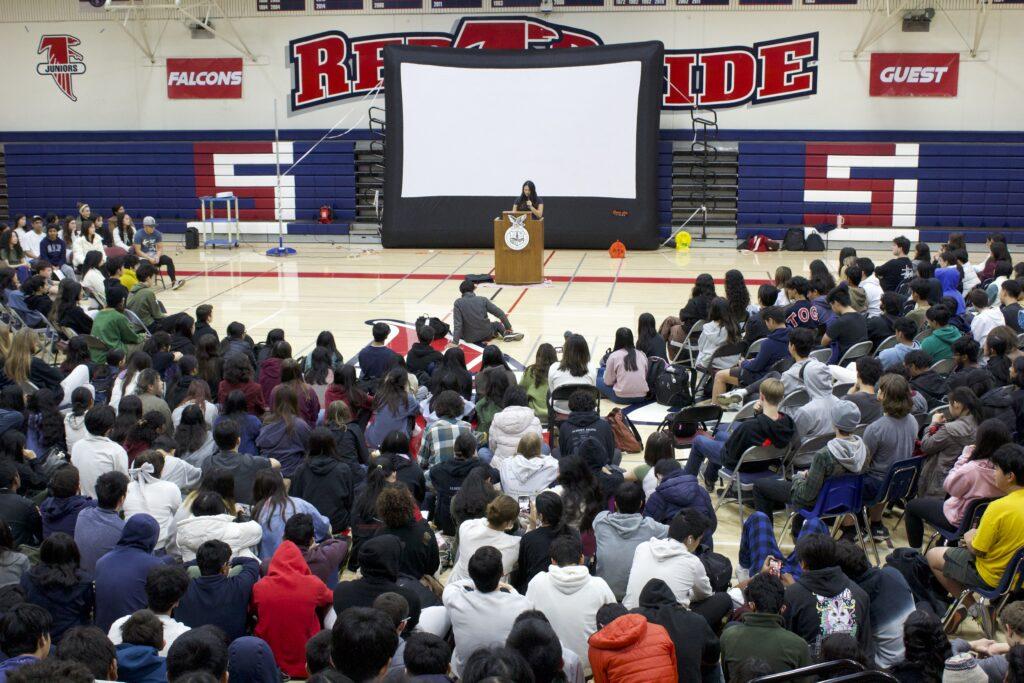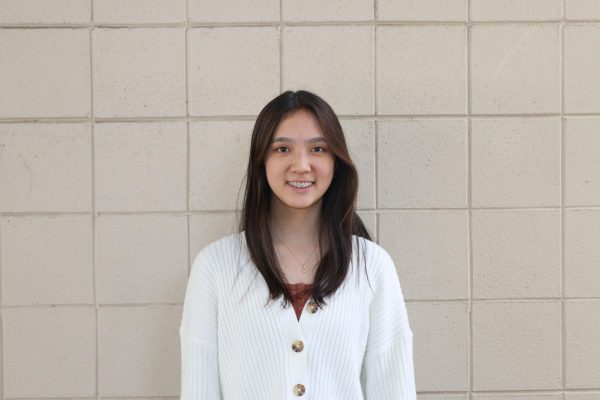The annual Speak Up For Change week, which lasted from Jan. 22 to 26 this year, had the theme of “Creating Your Own Wave.” The event was mainly organized by senior ASB vice president Emily Ta and the Speak Up For Change committee, which included senior Isara Chankhunthod, junior Vera Fung, sophomore Ava Cai and freshman Anson Hulme.
During tutorials and lunch, students were able to engage in various activities related to the theme. During a showing of “Inside Out” in the student center, guidance counselors Toni Jones and Frances Saiki handed out freshly popped popcorn to students. Several students quietly created art in the Wellness Center during “Paint Your Stress Away,” an event organized by freshman Madhura Natarajan. Other activities included creating friendship bracelets, hosted by assistant principals Kristen Cunningham and Abra Evanoff, and a musical performance in the quad by the group Singing for Smiles.
The week culminated with an all-school Friday assembly during tutorial. Featured speakers were Chemistry Honors teacher Kathy Nakamatsu and juniors Aiden Chen, Angie Chen and Amy Pan.
“Childhood should be about putting ourselves out there to find something that we can be passionate about” — junior Aiden Chen
Chen was the first to take the stage. In his alternately witty and serious speech, he implored the audience to break the mold of seeking only financial stability and instead take advantage of their countless resources to try different things and identify true passions. He expressed gratitude to his parents for allowing him to quit activities he wasn’t interested in to make room for ones that he was.
“Try things, even if you don’t want to! If you like them, stick to them, and if you don’t, get the hell out of there,” Chen said.
In front of a solemn audience, he reminisced about the constant support his mother would give him, and after her death from cancer last June, how he decided to honor her life by constantly striving to be who she always wanted him to be: “Happy, healthy and a good person.”
“What is on the inside is so much more important” — junior Angie Chen
Next on the podium was Angie Chen. She described how she grappled with feelings of inadequacy: Her younger self felt that her naturally tall stature did not fit within traditional beauty standards imposed on her by society.
“I was tall, therefore I was fat, and therefore I wasn’t as pretty as the smaller, shorter girls,” Chen said. “I was four, and I was already comparing myself to other girls.”
As she grew older, her negative self-perception worsened, and she eventually developed eating disorders, severely impacting her health.
“Before I knew it, I was hospitalized,” Chen said. “At that moment I hated myself, for letting my imaginary friends, whose names were anorexia, bulimia and body dysmorphia, fuel the fire of the unhealthy obsession in my brain that important women in my life had ignited.”
Chen attributed her eventual recovery to encouraging words from adult mentors like her track team’s shotput coach. She called for parents and teachers in the audience to be aware of the potential of their words to raise the spirits of the young people that look up to them.
She concluded her speech with a plea to anyone in the audience struggling with self-esteem: “I hope that sometime soon, you choose yourself, and choose to get better.”
“Navigating the world in which it’s almost second nature to compare our behind-the-scenes to others’ highlights” — junior Amy Pan
Pan shared the behind-the scenes of her immigration to America at the beginning of middle school, reminding audience members that they should be empathetic to each other, as they never know what someone else is going through.
As an optimistic and outgoing 11-year-old Chinese immigrant, Pan became shy and introverted when she became lost in the new customs, a new language and the guilt she felt after her parents labored to establish themselves in a new country, with the goal being to better Pan’s education.
“I was struggling, academically, socially, and mentally,” she said. “This frustration of not keeping up ate away at my confidence, leaving me isolated and hopeless.”
Pan reminded the audience that when they are struggling, it will not last forever, and sometimes being lost is a part of growing up.
“Sometimes you do have to struggle, feel pain, and lose your way a little bit to determine what you want to stand up,” she said.
Through art, she transforms her adversity into something beautiful and also communicates with confidence and purpose. She ended her speech with a quote from her ninth grade MAP project, a pop-up book that explores the theme of growing up: “When July lakes turn into Sahara’s rain / when a thousand words turn into a stream / then I’ll fly beyond the sky / and tell myself that I lived up to the night.”
“I always tell my students we’re here to ask for help, but sometimes I need to take my own advice” — Chemistry Honors teacher Kathy Nakamatsu
Nakamatsu shared her journey of recovering from the challenges she faced when her first spouse, Jason, passed from a rare type of cancer called acute myeloid leukemia. She described her emotional highs of remission that came with the setbacks of her husband’s cancer and shared her experience healing through self-reflection — sharing her true thoughts with her therapist and close friends.
“There are good days and there are bad. Sometimes everything was going well, and then we’ll get some bad news that said it’s really backwards,” Nakamatsu said. “Jason liked to refer to these moments as speed bumps. They slowed us down but they didn’t stop us from doing things.”
While she initially kept her pain aside so as to not further “burden” her husband and coworkers, she decided to eventually make a to-do list for closure. Along with the probing questions her therapist asked — what are you scared of, what do you do now and how do your to-do items make you feel — Nakamatsu gradually found herself finding closure.
After three to four months, she found herself opening up to dating again. Nakamatsu eventually married again.
“We all need help at different times in our lives and for different reasons. It’s often difficult to ask for help as my expectations of what I can do [at that time] are often distorted,” she said. “But if I can take a step back and look at my situation as an outsider, I can usually figure something out. And if I allow myself to ask for help, overcoming those obstacles is even easier.”
To conclude the rally, CASSY therapist Shobha Vaidyanathan encouraged students and staff to always reach out so no student is alone amidst their struggles. She reminded students that 12 free therapy sessions are provided if they ever need to talk to someone.
“We want to give a huge thank you to all of our speakers for sharing their stories,” Ta said. “We admire your courage to speak out and you have truly inspired our campus.”


























